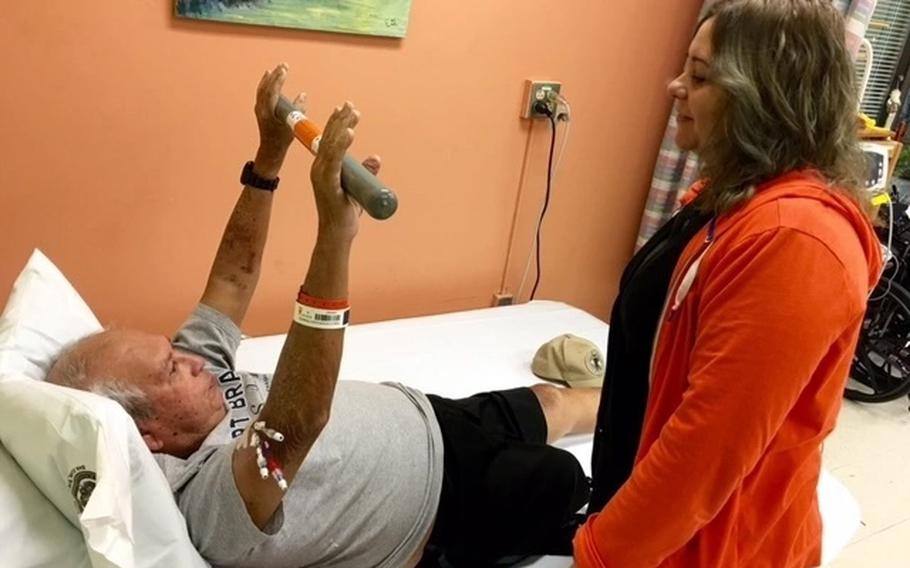
Occupational therapist Griselle Rivera Ortiz worked in January with veteran Pablo Rodriguez Ramirez, a patient at the San Juan VA Medical Center in Puerto Rico. A new report by the Government Accountability Office described significant challenges to accessing care for veterans living in the five U.S. territories and three Pacific island nations where the U.S. has military authority for defense and security. (Joseph Rivera Rebolledo/VA Caribbean Healthcare System)
WASHINGTON — Thousands of veterans who are residents of U.S. territories or reside on islands in the Pacific face significant challenges seeing medical specialists, getting their prescriptions filled or obtaining care from a facility that can manage their medical needs, according to a new federal watchdog report.
The Government Accountability Office report, which was published last week, found the veterans often experienced “unique and substantial barriers” that veterans in the United States do not encounter when seeking medical services from the Department of Veterans Affairs.
The passage of the Sergeant First Class Heath Robinson Honoring our Promise to Address Comprehensive Toxics Act, or PACT Act, in 2022 required the GAO to examine VA health care access in the U.S. territories, which are Puerto Rico, Guam, American Samoa, Northern Mariana Islands and the Virgin Islands.
The VA estimated the number of veterans living in U.S. territories to exceed more than 100,000 in June 2023, but the audit questioned the accuracy of the count, describing it as incomplete.
The PACT Act also required the GAO look at challenges to obtaining health care on the Marshall Islands, Micronesia and Palau. The independent island nations are collectively known as “freely associated states” because the U.S. by compact has responsibility for their security and defense. The VA estimated the number of veterans living on these islands was about 200 in June 2023.
Residents there can enlist in the U.S. military and can qualify for VA health benefits upon discharge. But there are no VA health facilities operating in the island nations, according to the report.
The VA conducted the report in part because the island nations are remote as are some of the U.S. territories, and these places lack a full range of VA health services.
The VA extends health care coverage through the Foreign Medical Program in locations where VA health care is not available. Veterans who require treatment for service-connected disabilities and medical conditions are reimbursed for care.
Legislation that took effect in March will offset expenses for veterans having to travel long distances between VA facilities for specialized and complex care, which will benefit veterans in U.S. territories who cannot receive the medical treatment, the report said.
The report also urged the VA to update its model for counting the number of veterans in U.S. territories.
“Since veterans who live in the territories are likely to travel great distance to receive some services, monitoring utilization and access to care for veterans in the territories using data that accounts for where veterans live — veteran location — would be more accurate than VHA’s current approach of using data based on where veterans receive care,” the report concluded.
The GAO cited other problems for accessing medical care for veterans in U.S. territories, depending on the location.
In American Samoa, where close to 1,000 veterans are enrolled in VA health care, the only island hospital is not accredited, according to the report. Without the proper accreditation, the VA is unable to refer veterans to the local hospital for care or pay for their services. The hospital operates the only lab on the island for doing blood work analysis, but its capabilities are limited.
The VA found cases where incorrect lab orders were submitted and inaccurate results reported, the report said. No changes have been made to correct the problems, though the VA has met with hospital officials to find solutions.
In Guam, the 5,700 veterans enrolled in VA health care often have lengthy delays when trying to pick up prescriptions, which are mailed to the island post office. The post office operates sporadically with packages delayed for pickup, the report said. The VA in February began allowing the VA outpatient clinic on the 210-square-mile island to receive the medications by mail and then notify veterans upon their arrival.
Guam veterans also must travel 3,800 miles to the Honolulu VA medical center for cardiac care and other specialty medical services unavailable at their local VA clinic, according to the report.
Auditors stated they believed the VA had undercounted the number of veterans living full time in Guam.
The VA estimated there were 12,800 veterans residing in Guam in 2023, while the Guam Office of Veterans Affairs estimated the number topped 23,000 veterans, based on records for drivers’ licenses and license plates.
In Puerto Rico, veterans also experience shortages of doctors who provide specialty services for more complex care, the report said.
More than 50,000 veterans who are residents of Puerto Rico are enrolled in VA health care, but the reimbursement rates to doctors for Medicare services are 25% less than in the continental U.S., according to the report. VA reimburses doctors at Medicare rates.
As a result, there is a smaller network of doctors providing VA medical care than is needed, according to the report.
Medicare savings programs, which help participants save money for out-of-pocket health care expenses, also are not available in Puerto Rico.
Veterans can seek referrals for care from non-VA doctors in their community, when they cannot access the medical services at VA facilities in a timely manner.
In fiscal 2022, the VA Caribbean Healthcare System based in San Juan coordinated health care for an estimated 61,000 enrolled veterans, according to the report. The system operates one hospital and 10 outpatient health care clinics.
The VA Pacific Islands Health Care System includes a VA medical center in Honolulu that coordinates care for veterans in Hawaii and an estimated 7,200 veterans who receive care at outpatient clinics in American Samoa, Guam and the Northern Mariana Islands, according to the report.